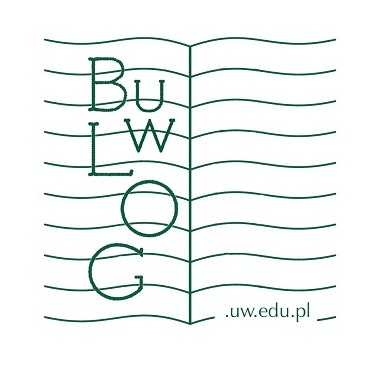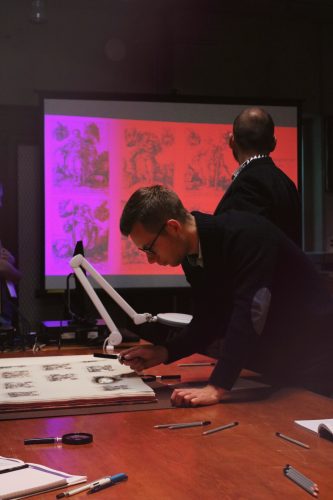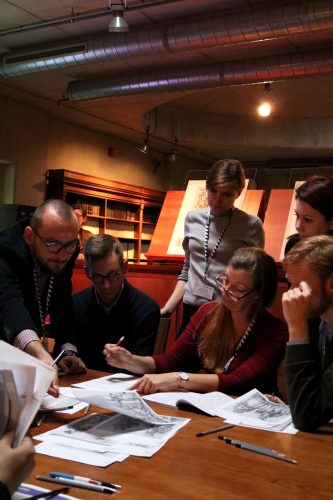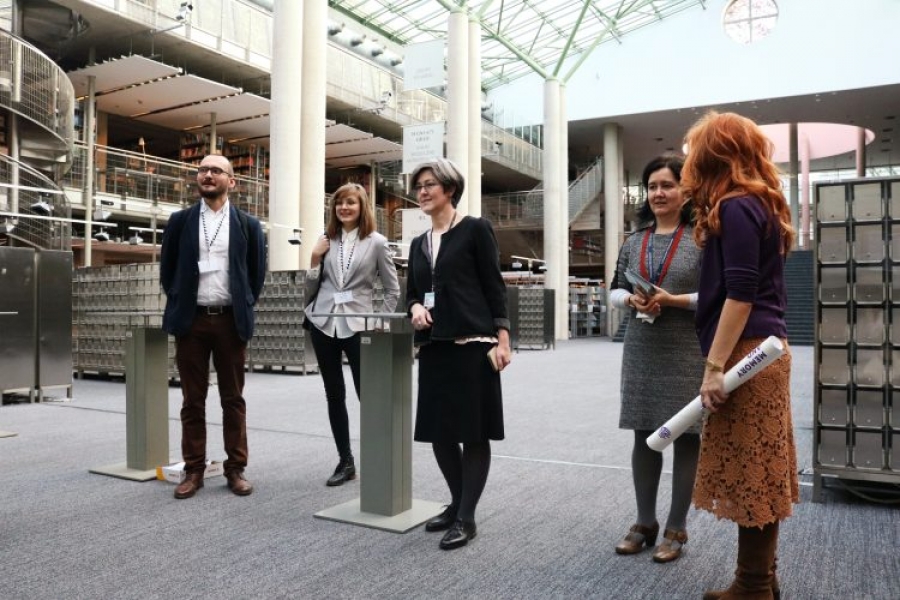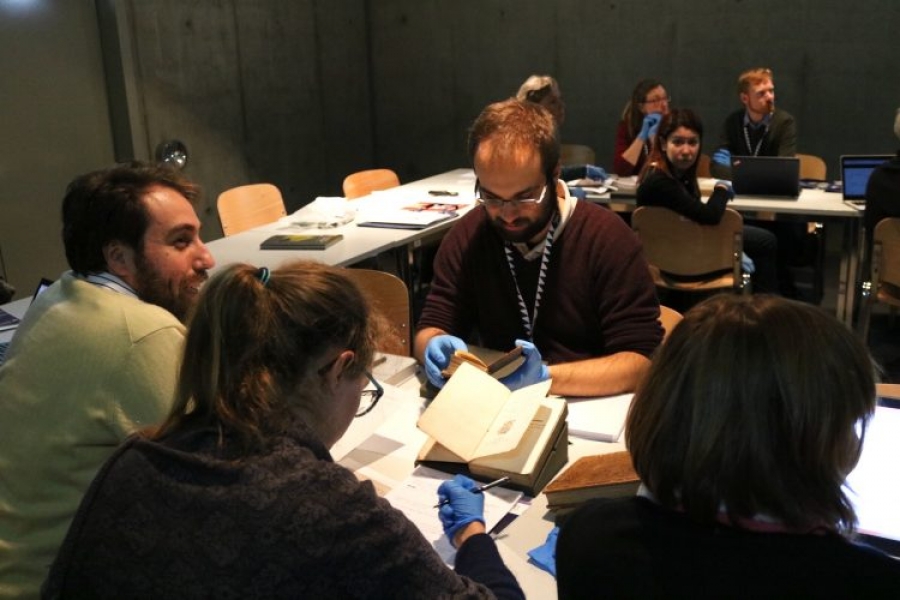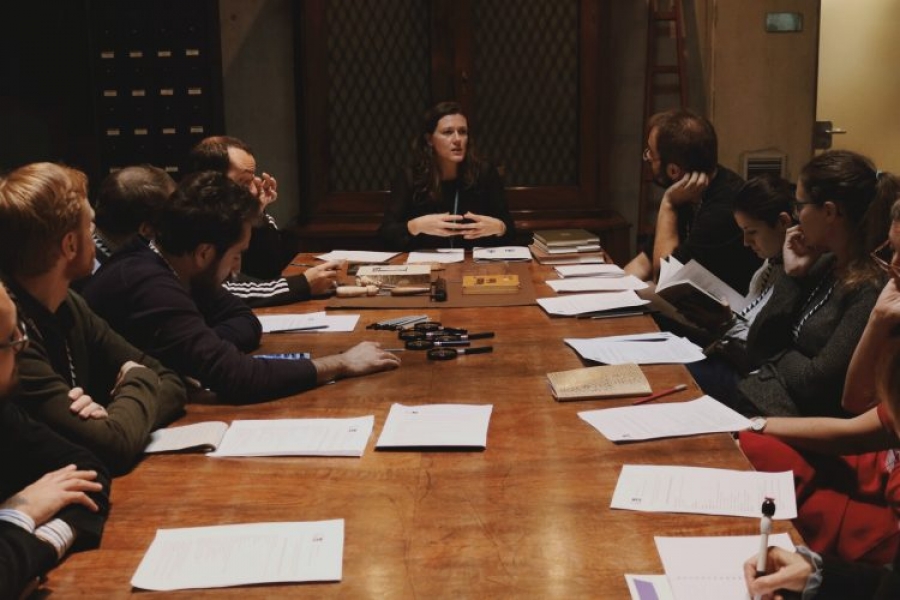W dniach 22-24 października 2018 r. członkowie projektu Horizon 2020 Research Infrastructure on Religious Studies (ReIReS) mieli okazję odwiedzić Bibliotekę Uniwersytecką w Warszawie podczas warsztatów poświęconych zarządzaniu zbiorami specjalnymi do celów badawczych. W warsztatach wzięło udział 18 przedstawicieli instytucji partnerskich, wśród nich: Fondazione per le scienze religiose „Giovanni XXIII” w Bolonii, Uniwersytet w Sofii, Uniwersytet Johannesa Gutenberga w Moguncji, Instytut Historii Europejskiej im. Leibniza w Moguncji oraz Uniwersytet Warszawski.
Ta część projektu ReIReS służyły stworzeniu stabilnej sieci kontaktów i współpracy pomiędzy instytucjami partnerskimi poprzez udział ich przedstawicieli w warsztatach. Trzydniowy cykl warsztatów w BUW miał na celu przegląd podstawowych źródeł dostępnych w całym konsorcjum, dotyczących tematu projektu (tj. historii religii sensu largo) oraz określenie możliwych sposobów ich wykorzystania w badaniach wspieranych przez dostosowane do tego zadania narzędzia cyfrowe. Warsztaty dotyczyły głównie problemu przekładalności zabytku z wymiaru materialnego na cyfrowy. Tematem spotkań były więc sposoby, w jakie „tradycyjne” źródło może ujawnić nowe informacje, gdy podchodzi się do niego z pomocą nowego zestawu narzędzi lub umieszcza w nowym kontekście stworzonym przez dużą bazę danych.
Podczas warsztatów pracownicy gabinetów zbiorów specjalnych (tj. Gabinetu Starych Druków, Gabinetu Rycin i Gabinetu Zbiorów Kartograficznych) podzielili się swoimi doświadczeniami w pracy z historycznymi artefaktami oraz wskazali możliwości ich przenoszenia i opisywania w świecie wirtualnych baz danych. Podzielili się również ekspercką wiedzą na tematy związane ze specyfiką zbiorów biblioteki – historią jej zasobów, którą można odcyfrować dzięki analizie znaków własności i adnotacji; symbolicznym znaczeniem wczesnonowożytnych map i metod ich interpretacji, wiedzą o powiązaniu materiałów graficznych w zbiorach BUW z dokumentami archiwalnymi zlokalizowanymi gdzie indziej.
Uczestnicy, wśród których znaleźli się głównie historycy i bibliotekarze, mieli szansę zapoznać się z następującymi narzędziami, bazami danych oraz bibliotekami cyfrowymi:
Katalogi:
The Union Catalog of Polish Research Library Collections NUKAT: http://katalog.nukat.edu.pl/search/query?locale=EN&theme=nukat
KVK (Karlsruher Virtueller Katalog): https://kvk.bibliothek.kit.edu/?digitalOnly=0&embedFulltitle=0&newTab=0
NUKAT: http://katalog.nukat.edu.pl/lib/item?id=chamo:1857201&fromLocationLink=false&theme=nukat
Polskie Biblioteki Cyfrowe:
Federacja Bibliotek Cyfrowych: https://fbc.pionier.net.pl/
e-bUW: http://ebuw.uw.edu.pl/dlibra
Polona: https://polona.pl/
Provenance research:
Archivio possessori Venezia: https://marciana.venezia.sbn.it/la-biblioteca/cataloghi/archivio-possessori
Archivio possessori Bologna: http://badigit.comune.bologna.it/possessori/
Owners of Incunabula: https://data.cerl.org/owners/_search
Material Evidence in Incunabula: https://data.cerl.org/mei/_search
Studia nad emblematami:
Emblematica Online: http://emblematica.grainger.illinois.edu/
Emblem Project Utrecht (seventeenth-century Dutch love emblems of the 17th Century): http://emblems.let.uu.nl/
French Emblems at Glasgow: http://www.emblems.arts.gla.ac.uk/french/
The Study and Digitalisation of Italian Emblems: https://www.italianemblems.arts.gla.ac.uk/search.php
Arkyves: http://arkyves.org/
W serii rozmów kończących każdy dzień warsztatów uczestnicy dyskutowali o rozwiązaniach przyjętych w tych bazach danych oraz o możliwości ich integracji i modyfikacji w narzędziach tworzonych pod patronatem konsorcjum.
Ponieważ celem projektu jest stworzenie wyszukiwarki wspomagającej badanie historii religii, głównym materiałem badawczym są książki i stare druki. Gabinet Starych Druków przygotował słownik nomenklatury specjalistycznej, który stanie się zaczynem wielojęzycznego słownika uzupełnionego przez innych partnerów projektu ReIReS.
Prezentacja metod wypracowanych podczas wieloletnich badań proweniencyjnych pracowników Gabinetu Starych Druków, okazała się jednym z najbardziej owocnych szkoleń dla zagranicznych bibliotekarzy.
Broszura z warsztatów dostępna jest tutaj: https://reires.eu/wp-content/uploads/2018/10/ReIReS-Guide-Workshop-2.1-Warsaw-2018-FINAL.pdf
Więcej informacji na temat projektu można znaleźć na stronie internetowej ReIReS (https://reires.eu). Zachęcamy także do zapisania się do newslettera w celu otrzymywania najnowszych wiadomości na temat nadchodzących warsztatów.
From the 22nd to the 24th of October 2018 members of the Horizon 2020 project Research Infrastructure on Religious Studies (ReIReS) were visiting University of Warsaw Library for a workshop on the management of special collections for research purposes. The workshop gathered 18 representatives of partner institutions, among them Fondazione per le scienze religiose “Giovanni XXIII” in Bologna, Sofia University, Johannes Gutenberg University in Mainz, the Leibniz Institute for European History in Mainz, and University of Warsaw.
This part of the ReIReS project was dedicated to establishing stable network of contacts and collaboration among the partner institutions through participation of their representatives in workshops. The three-day series of workshops in BUW was aimed at creating an overview of primary sources available throughout consortium that pertain to the topic of the project (i.e. history of religion sensu largo), and to map possible ways of using them in research supported by tailored digital tools. These workshops were aimed at addressing the problem of translation from the material to digital and the ways the “traditional” source can reveal new information when approached with a new set of tools or put in the new context created by a large database.
During the workshop, employees of the Special Collections Departmens (i.e. Early Printed Books Department, Maps Department, and Print Room) shared their experience in working with historical artifacts and pointed out the possibilities of transferring and describing them in the world of virtual databases. They also shared their expert knowledge on topics related to the specificity of BUW’s holdings, like fragments of historical libraries preserved in the Library documented by ownership marks and annotations, symbolic meaning of early modern maps and methods of their interpretation, connections between graphic materials in the BUW’s collections and archival documents located elsewhere.
The participants, mainly historians and librarians, got acquainted with the following tools, databases and digital libraries:
Catalogues:
The Union Catalog of Polish Research Library Collections NUKAT: http://katalog.nukat.edu.pl/search/query?locale=EN&theme=nukat
KVK (Karlsruher Virtueller Katalog): https://kvk.bibliothek.kit.edu/?digitalOnly=0&embedFulltitle=0&newTab=0
NUKAT: http://katalog.nukat.edu.pl/lib/item?id=chamo:1857201&fromLocationLink=false&theme=nukat
Polish Digital Libraries:
Polish Digital Libraries Federation: https://fbc.pionier.net.pl/
University of Warsaw Digital Library e-BUW: http://ebuw.uw.edu.pl/dlibra
Polona: https://polona.pl/
Provenance research:
Archivio possessori Venezia: https://marciana.venezia.sbn.it/la-biblioteca/cataloghi/archivio-possessori
Archivio possessori Bologna: http://badigit.comune.bologna.it/possessori/
Owners of Incunabula: https://data.cerl.org/owners/_search
Material Evidence in incunabula: https://data.cerl.org/mei/_search
Emblem studies:
Emblematica Online: http://emblematica.grainger.illinois.edu/
Emblem Project Utrecht (seventeenth-century Dutch love emblems of the 17th Century): http://emblems.let.uu.nl/
French Emblems at Glasgow: http://www.emblems.arts.gla.ac.uk/french/
The Study and Digitalization of Italian Emblems: https://www.italianemblems.arts.gla.ac.uk/search.php
Arkyves: http://arkyves.org/
In a series of roundtable discussions the participants discussed the solutions adopted in these databases and the possibility of their integration and modification in the tools created under the umbrella of the consortium.
Since the aim of the project is to create a search engine to assist in the study of the history of religion, the main research material are books and old prints. Early Printed Books Department has prepared a dictionary of specialist nomenclature, which will become the leaven of a multilingual dictionary complemented by other ReIReS project partners.
The presentation of methods developed during many years of provenance research of Early Printed Books Department employees turned out to be one of the most fruitful trainings for foreign librarians.
The booklet of the workshop is available here: https://reires.eu/wp-content/uploads/2018/10/ReIReS-Guide-Workshop-2.1-Warsaw-2018-FINAL.pdf
For more information about the project please visit the ReIReS’ website (https://reires.eu) and sign up to the newsletter.
Tekst/Text: Alicja Bielak, Wydział Artes Liberales Uniwersytetu Warszawskiego
Foto: Laura Bielak
